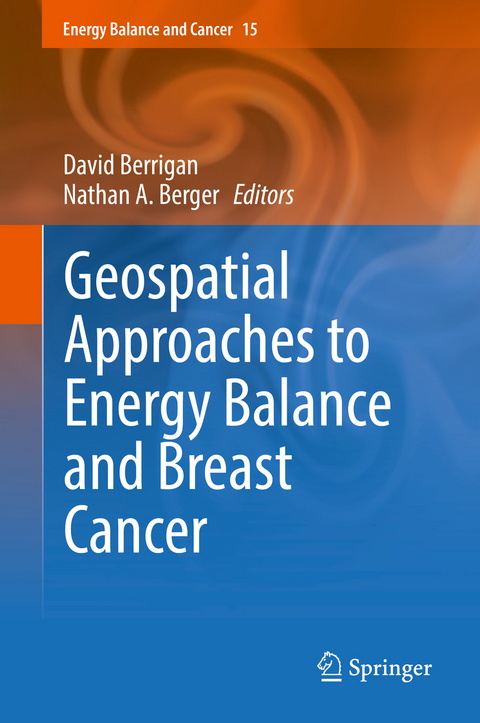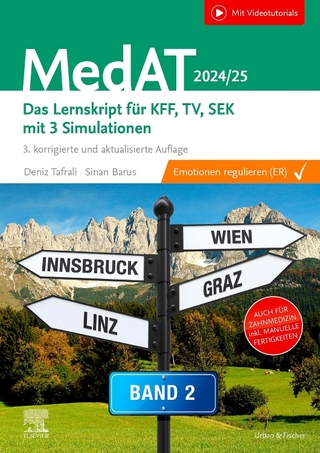
Geospatial Approaches to Energy Balance and Breast Cancer
Springer International Publishing (Verlag)
978-3-030-18407-0 (ISBN)
David Berrigan, PhD MPH, has been a biologist and Program Director in the Division of Cancer Control and Population Sciences since 2003 and is currently a member of the Health Behaviors Research Branch. Dr. Berrigan received his Ph.D. in biology from the University of Utah in 1993 and M.P.H. from UC Berkeley in 2000 and undertook Postdoctoral training at the University of Washington, La Trobe University and the National Cancer Institute. His research has examined energy balance, carcinogenesis, physical activity, and acculturation using a mix of animal models, population data, and methodological research aimed at improving survey data and incorporating geospatial thinking into cancer prevention and control. He is strongly committed to research aimed at health and health equity for all via environments and institutions that foster well-being, preventive services, and care regardless of demographic or economic circumstances. Nathan A. Berger, MD, Distinguished University Professor and Hanna-Payne Professor of Experimental Medicine, Biochemistry, Genetics and Oncology, is Director of the Case Western Reserve University Center for Science, Health and Society. He obtained the MD degree from Hahnemann University, Philadelphia, PA, interned at Michael Reese Medical Center, Chicago, IL, and served as a medical resident and Hematology/Oncology Fellow at Washington University, St. Louis, MO. Dr. Berger was a research associate in the Laboratory of Molecular Biology, Gerontology Research Center, NICHD, NIH, Baltimore, MD. He was on the faculty at Washington University School of Medicine, before moving to Case Western Reserve University School of Medicine where he served consecutively as Chief, Hematology/Oncology Division, Cancer Center Director, Dean, CWRU School of Medicine and now Director, Center for Science, Health and Society. His research focuses on model systems to study impact of diet, obesity and exercise on aging and cancer and studies to translate and evaluate these observations in human subjects.
Part One - Overview and Spatial Methods.- Chapter 1: Connecting Population, Health and Place (With Geospatial Tools and Data).- Chapter 2: Analyzing cancer and breast cancer in space and time.- Chapter 3: Creating Maps and Mapping Systems for Cancer Control and Prevention.- Chapter 4: Physical Activity and Exposure in Breast Cancer Survivors Using GPS, GIS, and Accelerometry.- Chapter 5: Towards Systematic Methods in an Era of Big Data: Neighborhood Wide Association Studies.- Chapter 6: Geospatial Approaches to Environmental Determinants of Breast Cancer in the California Teachers Study.- Chapter 7: Systematic Review of Geospatial Approaches to Breast Cancer Epidemiology.- Part Two - Environment and Context.- Chapter 8: Studying the Influence of the Neighborhood Obesogenic Environment on Breast Cancer in Epidemiological Cohorts: the Multiethnic Cohort.- Chapter 9: Spatial analyses of Environmental Exposures and Breast Cancer: Natural Vegetation, Ambient Air Pollution and Outdoor Light at Night as Examples.- Chapter 10: Neighborhoods and Breast Cancer Survival: The Case for an Archetype Approach.- Chapter 11: Environmental Modification of Adult Weight Loss, Physical Activity, and Diet Intervention Effects.- Part Three - Screening, Diagnosis and Beyond.- Chapter 12: Geographic Influences on Screening Mammography.- Chapter 13: Spatial and Contextual Analyses of Stage at Diagnosis.- Chapter 14: Geographic Variation in Medical Neighborhoods for Breast Cancer Care: Diagnosis and Beyond.- Part Four - Cross-cutting Topics.- Chapter 15: Persistent racial disparities in breast cancer mortality between Black and White women: what SR.- Chapter 16: Rural-Urban Disparities in Breast Cancer: Six Suppositions and Future Directions.- Chapter 17: Microenvironmental Influences on Team Performance in Cancer Care.- Chapter 18: Opportunities and Challenges in Geospatial Approaches to Breast Cancer Prevention and Control.- Index.
| Erscheinungsdatum | 27.07.2019 |
|---|---|
| Reihe/Serie | Energy Balance and Cancer |
| Zusatzinfo | XX, 440 p. 76 illus., 59 illus. in color. |
| Verlagsort | Cham |
| Sprache | englisch |
| Maße | 155 x 235 mm |
| Gewicht | 847 g |
| Themenwelt | Medizin / Pharmazie ► Studium |
| Schlagworte | Breast Cancer • cancer control • energy balance and breast cancer • geospatial approaches to breast cancer • spatially related influences on cancer |
| ISBN-10 | 3-030-18407-2 / 3030184072 |
| ISBN-13 | 978-3-030-18407-0 / 9783030184070 |
| Zustand | Neuware |
| Haben Sie eine Frage zum Produkt? |
aus dem Bereich


